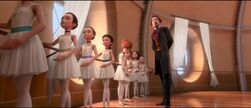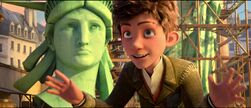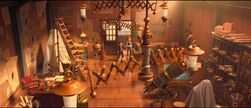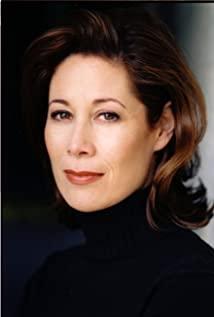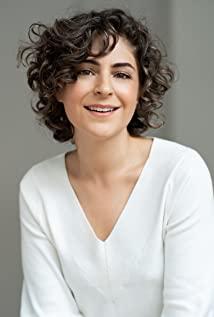The success of the film is that it creates a strong atmosphere of late nineteenth-century Paris, France. The Eiffel Tower is being built, and people are enjoying life in high spirits. Of course, this is bound to be accompanied by a little haze caused by social issues such as differences in wealth and class differences. But Paris and even France are still a society that advocates art, respects authority, and pursues dreams.
But where the film fails is precisely the rush to realize the dream. Whether it's the little inventor's boyfriend or Felicity's dance, it seems that these dreamers can make their dreams come true with almost no effort, just as the "French Dream" can become a reality overnight. While the French love romance, this is too romantic.
I regret that the moment Felicity stepped onto the stage did not coincide with the completion of the Eiffel Tower. Otherwise, why must there be that half-built tower? The tallest building in Paris, the one-hundred-year anniversary of the victory of the French Revolution, and the iconic building built for the World Expo and vowed to surpass the British Crystal Palace, is not the endorsement of the French dream of surpassing the United Kingdom and becoming the number one in Europe? Wouldn't it be a very beautiful image if Felicity's personal dream and the symbol of the French dream could be accomplished at the same time.
In fact, Felicity's ballet career has had few decent setbacks. She helped wipe the floor and got a full professor from a "hidden" master. She did not have the qualifications for admission but used deception to pass the test. She did not encounter any obstacles that she could not overcome. She was uninjured and had only one inexplicable defeat in a duel, but soon she was even more inexplicably victorious. If the film can make Felicity's ballet study last for two years like the construction period of the Eiffel Tower, then the difficulties she has experienced to succeed will be enough, and then her final indulgence will be really joyful and exciting. Emotional.
For Felicity's teacher, the former ballet master, by the end of the film, she should not only gain the love of the choreography authority, but more importantly, regain the joy and courage of dancing from Felicity's enthusiasm. She's been there from the start as someone who clearly has a story, but that story isn't digging deep, and her sideline isn't working to the fullest. Why did she get hurt, did she feel timid, was she disgusted but actually still longed to put on her dancing shoes and get on stage, ostensibly she was teaching Felicity dance skills, shouldn't it be Felicity who rekindled her What's inside? Because of this, the audience will be ignited by the way.
The Nutcracker is Tchaikovsky's classic ballet, but it only premiered in Russia in 1892. And the time that the film takes place is obviously 1888-1889, when the Eiffel Tower was built, which is quite a historical dislocation. Another historical dislocation is that Statue of Liberty. In 1885 it was boxed from France to the United States and finally unveiled in New York in 1886, which should not have been in Paris when the Eiffel Tower was being built anyway.
Animation Film Critics Club inside
View more about Leap! reviews




